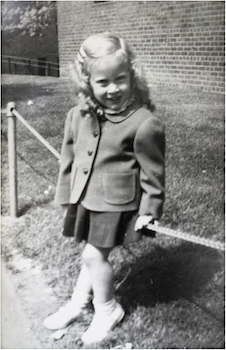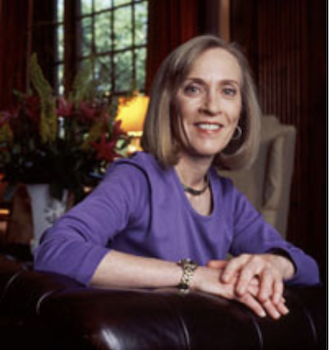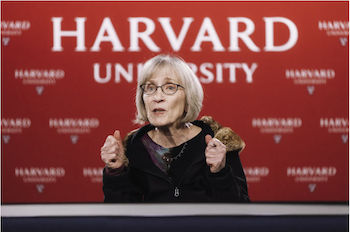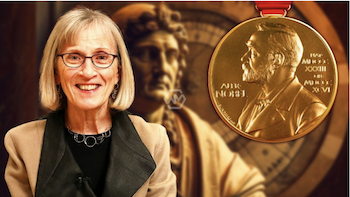
Claudia Dale Goldin was born on May 14, 1946 in New York City and grew up in the Parkchester section of the Bronx with her parents and older sister, Judy. As a child, Claudia was captivated by the mysteries of the mummies at the Museum of Natural History, and she developed an early ambition to be a detective. She was a lively and inquisitive young girl, making the most of New York City’s cultural offerings, from concerts at Carnegie Hall to ice skating at Wollman Memorial and exploring Greenwich Village.
Goldin's mother, who became an early childhood teacher and later an assistant principal at Public School 105 in the Bronx, and her father, a middle manager at Burlington Industries who worked with data processing and programmed an IBM 360, both influenced her formative years by encouraging her to explore her interests in the physical sciences.
During junior high school, she discovered a new passion for bacteriology through Paul de Kruif’s Microbe Hunters. This newfound interest in understanding the causes of infectious diseases led her to attend the Bronx High School of Science, where she embraced the thrill of scientific discovery and graduated in 1963.
In the summer of her junior year, Claudia took an undergraduate bacteriology course at Cornell University, part of a program sponsored by the U.S. National Science Foundation. This experience cemented her fascination with science and set the stage for her future achievements.

Goldin’s educational journey continued at Cornell University, where she pursued her undergraduate degree in economics. Graduating magna cum laude in 1967, she then moved on to the University of Chicago for her Ph.D. in economics, which she completed in 1972.
After completing her Ph.D., she began her professional journey as an assistant professor at the University of Wisconsin-Madison, where she taught from 1972 to 1979, and throughout which she conducted extensive research on the economic history of the labor markets and gender issues in the United States.
In 1979, Goldin joined the faculty at Princeton University as an associate professor. Her work at Princeton further established her reputation as a leading economic historian. She published several influential papers, including her groundbreaking study, “The Role of Women in the Labor Market in the Late 19th and Early 20th Centuries,” which provided new insights into the factors influencing women’s labor force participation and the socioeconomic barriers they faced.
In 1990, Claudia Goldin published her seminal work, “Understanding the Gender Gap: An Economic History of American Women,” a book that has become a cornerstone in the field of gender economics by analyzing the economic forces shaping the labor market experiences of American women over the past century. One of her key findings was the identification of the "quiet revolution" in women’s labor market participation, showing the significant shifts in female workforce dynamics since the late 20th century due to changes in societal norms, access to education, and the availability of birth control.

Furthermore, Goldin's career is marked by a series of groundbreaking contributions to economics. She made history by becoming the first woman to achieve tenure in the economics department at Harvard University in 1990. Her scholarly work delves into various aspects of labor economics, including the impact of technological change on labor markets, the history of education, and the evolving gender roles in society. One of her notable quotes captures the essence of her research: “One of the most important things in understanding the economic history of women is to understand that there is a lot of progress, but that progress has come at different speeds and different times for different groups of women.”
Goldin’s extensive body of work has earned her several prestigious awards. The IZA Prize in Labor Economics, which she received in 2016, specifically recognized her research on the gender wage gap, career and family dynamics, and historical labor trends. The Carolyn Shaw Bell Award, bestowed upon her in 2009 by the American Economic Association, honored her outstanding contributions to advancing the status of women in the economics profession – Goldin's efforts in mentoring young female economists and her advocacy for greater gender diversity within academic institutions were pivotal in earning this recognition.
Beyond her publications, Goldin has held several prestigious positions in the academic community. She served as the President of the American Economic Association and is a member of the National Academy of Sciences.
Goldin’s research has had a profound impact on both a generation of economists and policymakers. For example, her work on the career and family dynamics of women has shaped discussions on work-life balance policies in both academia and the corporate world. Additionally, her studies on the gender wage gap have informed legislative efforts aimed at promoting equal pay, such as the Lilly Ledbetter Fair Pay Act in the United States.

Claudia Goldin is married to Lawrence F. Katz, an economist and professor at Harvard University. Their shared commitment to economic research and academia has been an important aspect of their partnership, and together they have made significant contributions to the field. In fact, their collaborative research on the dynamics of inequality and education has provided valuable insights into the long-term economic impacts of educational policies and access.
One of the crowning achievements of Goldin's illustrious career came in 2023 when she was awarded the Nobel Prize in Economics. Goldin was honored for providing the first comprehensive account of women's earnings and labor market participation through the centuries as her work meticulously documented the evolution of women's roles in the economy and the persistent challenges they face. Her Nobel Prize acceptance speech emphasized the importance of continuing to address the gender disparities that still exist in labor markets worldwide.
As of today, Claudia Goldin continues to be an active and influential figure in economics. Her legacy is already well-established, with her pioneering work in gender economics and labor history continuing to inspire and inform future generations of economists, such as Marianne Bertrand, a leading economist known for her work on gender and labor economics, who has cited Goldin’s research as influential in shaping her own work.
Indeed, Claudia Goldin's life and work embody the pursuit of knowledge and the commitment to social progress. Her extensive research has not only provided valuable insights into the economic history of women but has also paved the way for more equitable economic policies. As she continues to shape the field of economics, her influence and legacy will undoubtedly endure for many years to come.
Why Did I Choose to Research Claudia Dale Goldin?
I chose to research Claudia Goldin because her work perfectly aligns with my passion for economics and social justice. From a young age, I’ve been intrigued by how economic systems shape our lives, and Goldin’s focus on the economic roles and challenges faced by women speaks directly to my interests. Her ability to combine thorough economic analysis with a deep understanding of historical and social contexts has been truly inspiring to research. Moreover, Goldin’s journey – from a curious student to a groundbreaking economist – resonates with my own academic goals and background, serving as the driving force behind my commitment to studying economics and its impact on societal issues.
Works Cited
Alter, Charlotte. “Nobel Laureate Claudia Goldin Told the 'Big and Bold' Story Other Economists Ignored.” Time, 21 February 2024, https://time.com/collection/women-of-the-year/6691521/claudia-goldin/
Friedlander, Blaine. “Claudia Goldin '67 wins Nobel Prize in Economics | Cornell Chronicle.” Cornell Chronicle, 9 October 2023, https://news.cornell.edu/stories/2023/10/claudia-goldin-67-wins-nobel-prize-economics
Smialek, Jeanna. “Claudia Goldin Wins Nobel in Economics for Studying Women in the Work Force.” The New York Times, 11 October 2023, https://www.nytimes.com/2023/10/09/business/economy/claudia-goldin-nobel-prize-economics.html
Walker, Peter J. “Profile of Harvard Economist Claudia Goldin – IMF Finance & Development Magazine | December 2018.” International Monetary Fund (IMF), https://www.imf.org/en/Publications/fandd/issues/2018/12/profile-of-harvard-economist-claudia-goldin
“Claudia Goldin – Biographical - NobelPrize.org.” Nobel Prize, The Nobel Prize, 2023, https://www.nobelprize.org/prizes/economic-sciences/2023/goldin/biographical/
This article was published on 10/2/24